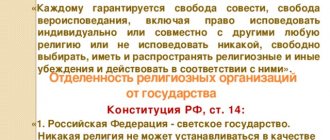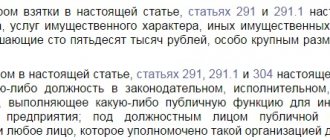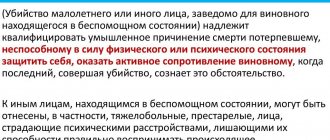ST 148 of the Criminal Code of the Russian Federation.
1. Public actions expressing obvious disrespect for society and committed with the aim of insulting the religious feelings of believers are punishable by a fine in the amount of up to three hundred thousand rubles or in the amount of the wages or other income of the convicted person for a period of up to two years, or by compulsory labor for a term of up to two hundred forty hours, or forced labor for up to one year, or imprisonment for the same period.
2. Acts provided for in part one of this article, committed in places specially designed for worship, other religious rites and ceremonies, are punishable by a fine in the amount of up to five hundred thousand rubles or in the amount of the wages or other income of the convicted person for a period of up to three years, or compulsory labor for a term of up to four hundred eighty hours, or forced labor for a term of up to three years, or imprisonment for the same term with or without restriction of freedom for a term of up to one year.
3. Illegal obstruction of the activities of religious organizations or the conduct of worship services, other religious rites and ceremonies is punishable by a fine in the amount of up to three hundred thousand rubles or in the amount of the wages or other income of the convicted person for a period of up to two years, or by compulsory labor for a period of up to three hundred and sixty hours, or correctional labor for up to one year, or arrest for up to three months.
4. Acts provided for in part three of this article, committed: a) by a person using his official position; b) with the use of violence or with the threat of its use - shall be punishable by a fine in the amount of up to two hundred thousand rubles, or in the amount of the wages or other income of the convicted person for a period of up to one year, or by compulsory labor for a term of up to four hundred eighty hours, or by corrective labor for a term of up to two years, or forced labor for up to one year, or imprisonment for the same period with deprivation of the right to hold certain positions or engage in certain activities for up to two years.
How did criminal liability emerge?
Until 2013, insulting the feelings of believers was classified as an administrative offense
according to Art. 5.26 Code of Administrative Offenses of the Russian Federation “Violation of legislation on freedom of conscience, freedom of religion and religious associations.” The article is still in effect. In particular, it provides for a fine of up to 200 thousand rubles. or compulsory work up to 120 hours per
deliberate public desecration of religious or liturgical literature, objects of religious veneration, signs or emblems of ideological symbols and paraphernalia, or their damage or destruction.
In June 2013, in the wake of the scandal surrounding the action of the Pussy Riot group in the Cathedral of Christ the Savior, amendments were made to Art. 148 of the Criminal Code of the Russian Federation.
Instead of “Obstruction of the right to freedom of conscience and religion,” it became called “Violation of the right to freedom of conscience and religion” and was supplemented with two paragraphs:
1. Public actions expressing clear disrespect for society and committed with the aim of insulting the religious feelings of believers.
2. Acts provided for in the first part of this article, committed in places specially designed for worship, other religious rites and ceremonies.
The upper limit of punishment is three years in prison.
According to the Judicial Department of the Supreme Court, to date,
courts have handed down only seven sentences
under this article.
How can you determine whether specific statements are offensive?
The goal of a destructive, humiliating impact on the value system of believers was introduced by the legislator into the design of the norm as a mandatory element of the composition. Without it, it is impossible to prosecute.
To understand what the essence of insult is, it is worth turning to administrative legislation, since in 2011 this act was decriminalized and included in the Code of Administrative Offenses of the Russian Federation (Article 5.61).
Insult is understood as actions or statements that humiliate another person, expressed in an indecent form.
This offense should be distinguished from libel – the dissemination of knowingly false information that damages the reputation of the victim.
As can be seen from the above definitions, providing truthful information to outsiders can also be considered an insult, but in a form that is not generally accepted and causes rejection among people.
Regarding insults to the views of believers, to insult means:
- Act publicly.
- Express through your actions a clear disregard for social norms and rules.
- To humiliate in an indecent manner the worldview of at least two adherents of religions permitted in Russia.
In the presence of the above conditions, in particular, the following offenses can be recognized as criminal: ridicule of theistic canons and dogmas accompanied by obscene language, rude criticism of a person’s personal traits associated with belief, indecent behavior in relation to revered objects of worship, nudity and posing in or in front of temples, putting derogatory texts on T-shirts and much more.
Who was tried and for what?
In February 2016, a trial began in Stavropol in the case of blogger Viktor Krasnov, who, in a dispute on the social network VKontakte, wrote that “There is no God,”
and called the Bible “a collection of Jewish tales.”
The examination found Krasnov sane. In February 2022, the case was closed due to the expiration of the statute of limitations.
In April 2016, the Kirovsky District Court of Yekaterinburg sent local resident Anton Simakov to forced treatment
to a psychiatric clinic.
In October 2014, Simakov performed a “rite” in his office using a voodoo doll, the blood of a sacrificial animal, and also objects of Christian worship.
Simakov left the hospital in January 2022.
In April 2016, the Orenburg court fined him 35 thousand rubles.
teacher of Orenburg Medical University Sergei Lazarov.
In 2013,
in the article “Evil Christ”, published on Lazarov’s website, negative epithets were given in relation to Christ
- “murderer” and “tyrant”.
In July 2016, the Kirov Regional Court found guilty under Art. 148 of the Criminal Code of the Russian Federation by Konstantin Kazantsev and Rustem Shaidullin.
According to investigators, they
hung a homemade effigy with an offensive inscription on a worship cross
in the village of Staraya Malinovka. Each received 230 hours of correctional labor.
In July 2016, the Elista City Court sentenced Said Osmanov, an athlete from Dagestan, to two years of probation.
Osmanov
hit a Buddha statue in a Buddhist temple and urinated on it,
and then posted the video on the Internet.
If you are charged with insult
You can become accused of anti-religious actions even by simply publishing an inappropriate video on your social network page, or by reposting someone else’s statement. And although in judicial practice no real criminal punishment has yet been awarded for such acts, the accusation itself and the subsequent trial can bring many problems.
In such a situation, it is best to seek the help of a lawyer so as not to bring the matter to court and end with reconciliation of the parties. If this is not possible, then it is worthwhile to competently build a defense position in court.
Pay attention to the wording of clause 1 of Art. 148 – a qualifying feature of a crime is the presence of a goal to offend the feelings of a believer. The justification can be based on the fact that the illegal action was committed for a different purpose - to prove one’s point of view, to defend political or moral beliefs, and not to offend the religious values of the opponent.
What lawyers say
Andrey Knyazev, Chairman of the Knyazev and Partners Bar Association:
“This amendment to the Criminal Code is absolutely unnecessary. We have criminal penalties for hooliganism, and this should be applied to such types. Insolence, disrespect for society - this is all hooliganism. For some reason, our society has begun to be divided into believers and non-believers, and then they will be divided separately into communists and homosexuals.”
Petr Skoblikov, Doctor of Law:
“Sokolovsky was convicted not for catching Pokemon in the temple, but for committing an illegal act. He visited the temple, where he secretly filmed catching Pokemon, after which he returned home and made a video in which he superimposed an audio sequence with offensive obscene language addressed to believers and the prayer procedure on the filmed video. And then he made this video public by posting it on the Internet for public viewing... This article protects not only the feelings of believers, it protects the human right to something dear and sacred.”
Vadim Volkov, scientific director of the Institute of Law Enforcement Problems at the European University in St. Petersburg:
“In this case, the trial is illustrative. Sokolovsky is a popular video blogger with many subscribers. Criminal repression against such people is a way of state intimidation.”
Evgeniy Tonkiy, managing partner of the Tonkiy and Partners group:
“In most cases, Article 148 is pulled by the ears. The concept of insult to personality is defined by the current Criminal Code of the Russian Federation and does not raise any questions, but insult to feelings is a new concept for the Russian legal system. The current version of Art. 148 does not comply with the rules of logic and legal technique, since it consists only of evaluative categories not explained by the legislator.”
Maria Bast, Chairman of the Association of Lawyers for Human Rights:
“Since the 19th century, no one has been imprisoned or burned at the stake for denying God - and suddenly such an article. There is a complete feeling that they are again trying to drag us into this dense Middle Ages.”
Evgeny Kozichev, Evgeny Fedunenko, Olga Shkurenko, group “Direct Speech”
Qualifying features
The offense of infringing the feelings of believers has a formal composition - that is, the very commission of this action is punishable by law, regardless of whether negative consequences occur.
- The crime is committed with direct intent - to hurt feelings and belittle the dignity of believers. The article states that the purpose is precisely to insult feelings, that is, a careless statement cannot be qualified as a crime.
- An important feature is the publicity of the act, that is, the action is not hidden, but on display (in the media, in public, on the Internet).
- The crime must be a manifestation of disrespect for society, that is, it must clearly violate existing social norms.
- Insult – a statement with defamatory content, made in an indecent form.
The legislative framework
As a regulatory framework for cases in this category, one should rely on the following legislative documents:
- “Criminal Code of the Russian Federation” dated June 13, 1996 N 63-FZ;
- “Criminal Procedure Code of the Russian Federation” dated December 18, 2001 N 174-FZ;
- Federal Law “On Freedom of Conscience and Religious Associations” dated September 26, 1997 N 125-FZ;
- Federal Law “On the procedure for considering appeals from citizens of the Russian Federation” dated May 2, 2006 N 59-FZ;
- Federal Law “On Police” dated 02/07/2011 N 3-FZ.
Judicial practice: sentences and punishment under Art. 148 of the Criminal Code of the Russian Federation
- Resolution of the Plenum of the Supreme Court of the Russian Federation dated... PLENARY OF THE SUPREME COURT OF THE RUSSIAN FEDERATION DECISION dated December 27, 2002 N 29 ON JUDICIAL PRACTICE IN CASES OF THEFT,...
- Resolution of the Plenum of the Supreme Court of the Russian Federation dated... PLENARY OF THE SUPREME COURT OF THE RUSSIAN FEDERATION DECISION of November 15, 2016 N 48 ON THE PRACTICE OF APPLICATION BY COURTS OF LEGISLATION GOVERNING FEATURES...
- Resolution of the Presidium of the Supreme Court of the Russian Federation dated... PRESIDIUM OF THE SUPREME COURT OF THE RUSSIAN FEDERATION DECISION dated December 5, 2018 N 126-P18 ON RESUMING PROCEEDINGS IN THE CASE DUE TO NEW...
- Decision of the Supreme Court: Resolution No. 310P13 dated... DECISION OF THE PRESIDIUM OF THE SUPREME COURT OF THE RUSSIAN FEDERATION Case No. 310-P13 Moscow January 23, 2014 Presidium of the Supreme Court of the Russian Federation...
- Judicial Collegium for Criminal Cases, appeal:... THE SUPREME COURT OF THE RUSSIAN FEDERATION Case No. 72-APU 17-21 APPEAL DECISION Moscow October 04, 2022 Judicial Collegium for Criminal Cases...
- Decision of the Supreme Court: Determination N 203-APU17-21... THE SUPREME COURT OF THE RUSSIAN FEDERATION Case No. 203-APU17-21 APPEAL DECISION Moscow August 31, 2022 Judicial Collegium for Military Personnel of the Supreme...
- Ruling of the ECtHR dated 02/14/2017 EUROPEAN COURT OF HUMAN RIGHTS THIRD SECTION CASE “MASLOVA VS. RUSSIAN FEDERATION” (Complaint No. 15980/12) JUDGMENT…
- Resolution of the Plenum of the Supreme Court of the Russian Federation dated... PLENAUM OF THE SUPREME COURT OF THE RUSSIAN FEDERATION DECISION dated June 25, 2022 N 18 ON JUDICIAL PRACTICE IN CASES OF CRIMES,...
- Resolution of the Plenum of the Supreme Court of the Russian Federation dated... PLENAUM OF THE SUPREME COURT OF THE RUSSIAN FEDERATION DECISION dated December 17, 2022 N 43 ON SOME ISSUES OF JUDICIAL PRACTICE IN CASES...
- Decision of the Supreme Court: Determination No. 38-АПУ17-2 dated... THE SUPREME COURT OF THE RUSSIAN FEDERATION No. 38-АПУ17-2 APPEAL DECISION Moscow March 1, 2022 Judicial Collegium for Criminal Cases of the Supreme Court...
Fake legislation that is "essentially an emergency"
Articles:
207.1 (public dissemination of knowingly false information about circumstances posing a threat to life and safety) and 207.2 of the Criminal Code (public dissemination of knowingly false socially significant information resulting in grave consequences)
Introduced:
in April 2022
The law was adopted:
in 1 day
How the articles changed
Punishment for fakes appeared in Russian legislation in 2019. Then its necessity was associated with the tragedy in the Kemerovo shopping center "Winter Cherry", where 60 people, including 37 children, died during a fire. After the fire, rumors quickly spread that in reality there were many more victims.
One of the sources of rumors was the Ukrainian prankster Evgeniy Volnov: he called the morgue under the guise of an employee of the Ministry of Emergency Situations and asked them to prepare to receive 300 bodies of the dead. In Russia, a pranker was sentenced in absentia on charges of calling for terrorism and inciting hostility. “The rubicon, after which it became obvious that regulation (legislative) was necessary, was the tragedy in Winter Cherry, when information about several hundred corpses in the morgues of Kemerovo was disseminated,” said Leonid Levin, head of the State Duma Committee on Information Policy, during a discussion of the law on fakes.
The dissemination of “unreliable socially significant information” was included in the Code of Administrative Offenses a year later - in the same package as the law on insulting authority. At first, the article was hardly used, Agora noted in its report, but with the onset of the coronavirus pandemic, the number of cases increased sharply.
Since then, the article about fakes has been updated more than once. The changes were related to the coronavirus, coverage of protests, rules for mentioning foreign agents, and even the trial of Navalny - they added punishment for “disrespect for military memory” (as the article was changed).
Already on April 1 - almost immediately after the introduction of the first coronavirus restrictions in Russia - two new articles appeared in the Criminal Code: 207.1 and 207.2 of the Criminal Code. They occupy a place between terrorist crimes and organized crime cases.
Initially, this coronavirus bill only mentioned Article 236 of the Criminal Code (violation of sanitary and epidemiological rules) - it was going to be tightened - but by the second reading both new articles about fakes appeared in it. The State Duma adopted the law on the same day, March 31, in the second and third readings, on the same day it was approved by the Federation Council, and the next day it was signed by the president.
These criminal articles are essentially not much different from the corresponding articles in the Administrative Code - and the choice of the type of prosecution remains entirely on the conscience of the police.
“The boundaries of criminal and administrative offenses remain extremely vague, and emerging practice shows that the same act can be unpredictably classified under the Criminal Code or the Code of Administrative Offenses,” Agora believes.
The first criminal case under the new article 207.1 of the Criminal Code was opened two days after it came into force. The reason was a post in the Sestroretsk News public page that a patient with coronavirus left the clinic on public transport. According to statistics from the Judicial Department of the Supreme Court, for the entire 2020, six people were convicted under the article, and another five received a court fine. No sentences were passed under Article 207.2.
Laws on disinformation will have a detrimental effect on freedom of speech, Natalya Zvyagina, director of Amnesty International in Russia, is sure: “The bill was developed and adopted at lightning speed, without any public discussion or legal expertise. In addition to the fact that it goes against the right to freedom of expression, it does not provide for any restraining mechanisms, time limits or public control, and in fact is an emergency that can completely destroy freedom of speech in the country.”
Illustration: Victoria Stebleva / Mediazona








